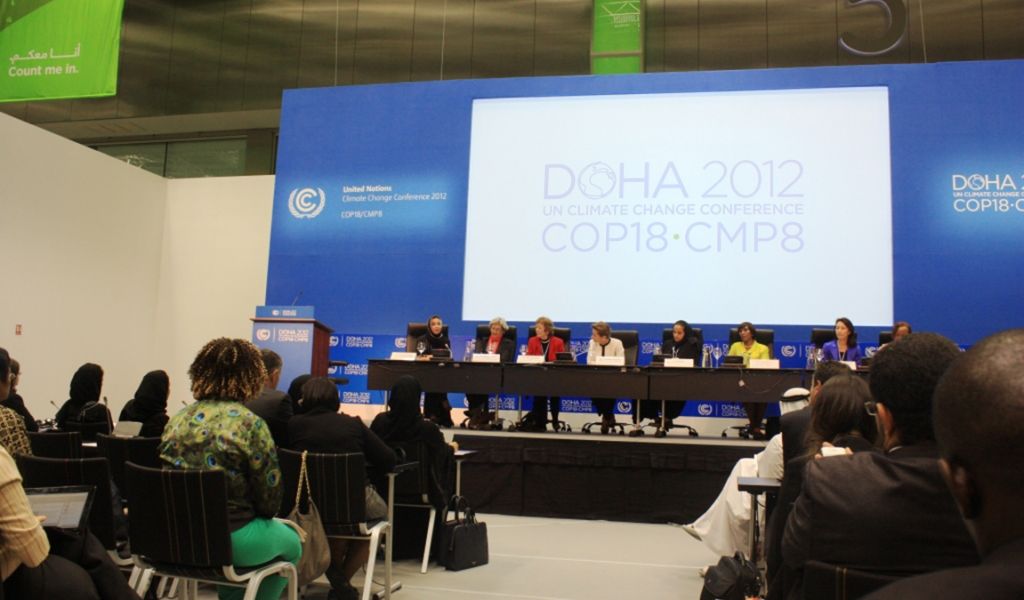Gender Mainstreaming in COP 18 Gets a Boost

Day two (November 27, 2012) in Doha was 'Gender Day’, with two back to back side events, the first on Gender and Climate Innovation: Breakthrough Changes for Gender Equality, and the other on Gender and Climate: Moving beyond the Rhetoric, organized by the Secretariat of the United Nations Framework Convention on Climate Change (UNFCCC).
The second event was attended by distinguished women, including Her Highness Sheikha Al Mayassa Bint Hamad Bin Khalifa Al-Thani, Chairperson of the Board of Trustees - Qatar Museums Authority; Ms. Mary Robinson, Former President of Ireland and President of the Mary Robinson Foundation – Climate Justice; Ms. Elena Manaenkova, Assistant Secretary General of the World Meteorology Organization; Ms. Julia Marton-Lefèvre, IUCN Director General; Ms. Nawal Al-Hosany, Director of Sustainability at Masdar, Abu Dhabi; and Ms. Julia Duncan-Cassell, Liberia’s Minister of Gender and Development.
New Challenges and the Role of Women
While highlighting the significant contribution of women in influencing sustainable consumption and production at the community level, safeguarding the natural environment and biodiversity, preserving traditional knowledge and judiciously allocating adequate and sustainable resources within the households and community, the panel reminded the audiences about some of the extraordinary challenges that we are facing today. By 2030, the world’s population will need 50% more food, 55% more energy, and 30% more water. Besides the growing challenges of food security, Ms. Mary Robinson reminded everybody that of the 7 billion people in the world today, 2.7 billion people in the rural areas still depend on wood fuel and livestock dung cakes, which have serious health impacts.
There is no denying the fact that women are central to fulfilling these growing household needs. Strong suggestions were made to adopt a gender smart approach by supporting decision making institutional structures at the local level that can be accessed equally by both men and women. These kinds of discussions highlight the need for climate change talks to be given a human face, as we are talking about half of the world’s population who will need to be actively involved for these initiatives to have any chance of success. We must recognize that the intellect, energy, and ingenuity of local communities can be used to find equitable solutions to the global problem of climate change. Without engaging such a large proportion of the world’s population, climate change solutions will fail to deliver on ground.
Improving Women’s Participation in Climate Negotiations
While reminding everyone that empowering women does not mean disempowering men, all the speakers emphasized that COP 18 provides an important opportunity to make women’s voices heard in climate change negotiations. Doha needs to build on the strong foundation provided by the Convention on the Elimination of All Forms of Discrimination Against Women (CEDAW), the Beijing Declaration and Platform for Action, the ground work done in Durban at COP 17, and more recently at the United Nations Conference on Sustainable Development (Rio+20). All of these have recognized women’s leadership and their vital role in achieving sustainable development, and particularly the Rio+20 outcome document has emphasized the impact of setting specific targets and implementing temporary measures when appropriate for sustainably increasing the number of women in leadership positions, with the aim of achieving gender parity.
While reminding audiences about the recent progress in advancing gender equality and women’s empowerment in international climate change policy, as well as some aspects of women’s representation in the UNFCCC bodies, these events pointed out that much remains to be done. In Doha, therefore, a draft resolution has been proposed for a new decision to promote gender equality through improving the participation of women in UNFCCC negotiations and in the representation of Parties in bodies established by the UNFCCC and Kyoto Protocol. Further, on December 5th, the President of COP 18 will have a ministerial level meeting with all parties to push this agenda further.
These are certainly positive and significant steps forward to further strengthening gender mainstreaming in climate change negotiations, and they send a strong political signal. Furthermore, these significant developments will ensure that women and men elected to UNFCCC bodies and involved in the negotiations will continue to fully address the gender dimension of climate change at future conventions. More importantly, at this crucial juncture of discussions on sustainable development goals and the post-2015 development framework, a landmark decision on women’s participation in climate change negotiations at COP 18 in Doha will be an important foundation for renewed commitment to the critical development goals of advancing gender quality and women’s empowerment.

